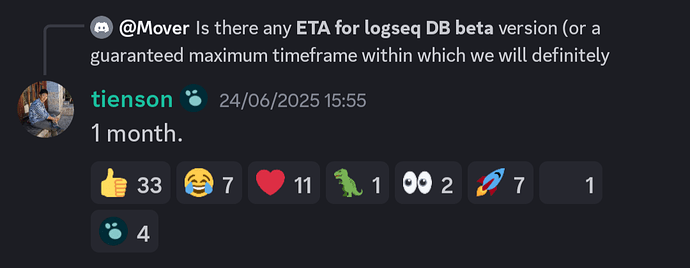Hi Karl. Your blog was very helpful when I was making the transition to org, so thanks for that. (I do think that in the context of markup syntax, the term org is sufficient for people to understand what we’re talking about. It can only refer to one thing. I think the term orgdown adds unnecessary complexity to the conversation, but I respect your work promoting the adoption of org in new contexts.)
I do think that Logseq still has a place for org users as long as the app continues to support the format. The custom markup of Logseq is indeed annoying given that Emacs doesn’t recognize it (although I suppose someone could write a package that does, if there were demand for it). However, my org usage is sufficiently simplistic that much of what I want to do is easily handled by and replicated within Logseq. The main reason I have been using Logseq less and less these days is that I just don’t want a document with every line beginning with a new heading. If people can get past that, Logseq is still probably the best org editor on mobile given its feature support such as collapsing headings and zooming in, along with adding images, which is otherwise pretty cumbersome.
While I have come to love Emacs, the problem I have with recommending it to people like the OP here is that it takes a lot of dedication to get started. It is counterintuitive to many in a world of GUI-first, electron-based note-taking apps. I learned Emacs over several months just to get to a level at which I was comfortable switching to it as a daily driver. Even I eventually felt like I had to install Doom to make it more usable for me. I was also handling much of my workflow in a terminal at the time I decided to switch to Emacs, so I wanted something that was very keyboard-oriented and that I could access within a terminal if necessary. Selling most people on this seems like a DOA proposal. And sadly, I can’t think of any other decent tools for using org outside of Emacs and Logseq.
Finally, I want to give my enthusiastic endorsement of Joplin. It’s just a really solid, reliable, open-source note-taking app that I think most people could be happy with. I mainly use it today because I used Evernote back in college, and when I switched away from that, Joplin was the most natural home for those notes. But having tried a lot of software since then, I am amazed at how well Joplin works given the alternatives. It’s a tank in a world of finicky sports cars.
I think it really depends on why you’re recommending note-taking software to other people. If you want them to be as close to feature parity with you in org-mode, then sure, Joplin is not that. But I think most people can find a workflow that works for them in Joplin. There’s even basic support for to-dos. The database structure is great because average users can find exactly what they need with a few keywords, no regexp needed. The folder structure in the sidebar is also something that will feel intuitive to most users.
I don’t think Markdown is a problem here, either. The fact that everything can be exported as MD with YAML metadata is great, and most of the supported markup has become standard in many apps. In fact, I’d wager this syntax has much broader support than org. So I think it’s wrong to see this as a kind of lock-in. The main issue with Markdown is that it is not as feature-rich as org, especially in areas concerning task management. Logseq tried to address this by bringing some org-like syntax to Markdown, but of course it is the only app that supports such a thing.
I think the only reason I would not recommend Joplin to someone is if I know that person is super dedicated to having everything saved in easily accessible plain text files. But this is a relatively rare need among people looking for a good note-taking app. It also requires that people find their own syncing solution. That’s a benefit for me. I use org in addition to Joplin because of the features it provides and because I get to use git versioning. If I’m updating a note frequently across machines, I’d rather have more granular control over versioning than what is available in something like Joplin.
Anyway, I obviously don’t think Joplin is a replacement for org or Logseq, but I do think it’s worth giving another shot.
![]()
